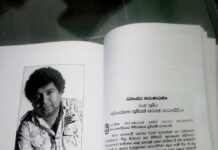ලිබරල්-Left කියවීමට එරෙහිව
There were many readers and interpreters of the 2019 presidential election result: some were jubilant, others lamented heavily. All strived to provide the most meaningful analysis of the post-election situation that for many, especially the losers, was a nightmare that couldn’t be explained under a consistent principle. Although I don’t agree, many from both camps almost unanimously agreed that the good governance (GG) government’s reconciliation outlook was a major factor that affected detrimentally to its later unseating. However, there are questions and assumptions about GG government’s reconciliation programme that we must confront, if at all we consider reconciliation is still a valid topic.
Before we get in to GG government’s reconciliation programme and outlook, we must entangle ourselves on a brief detour to place the problem correctly in the context. Some abstractions assist in this endeavour. From a theoretical point of view – those who despise theory must soon un-blind themselves by taking the example from devout theoretical practices of nationalist populists like Nalin De Silva that consistently anoint their hallowed power edifice – reconciliation does not strive to unite dis-unified parties. Philosophically, there is no harmonious “One” that later divides in to a differing “Two.” Rather, we should start with the non-binary “Two” itself. To put it simply, it is a grave conceptual mistake to think that reconciliation is a political project that endeavours to bring back the dis-unified parties (Two) – in our case ethnic communities – to a harmonious whole (One) that existed before they got dis-unified. The reason is that there was no such ethnically unified national identity in the first place.
There are no prodigal sons that a benevolent father needs to bring together in reconciliation. It’s not because that Sinhalese, Tamils, Muslims and other minorities are more than prodigal sons, but because that there was no “happy family” in the first place that the benevolent father – played probably by the GG government – must re-unite. Not only that there was no happy family before, but also that there cannot be one in future. Believing the contrary of the aforementioned, in my view, resulted in a colonial indoctrination of reconciliation that later brought down the very political force that brought it forth. Let’s peruse this apparent absurdity.
After all, what is so colonial about bringing the ethnicities together? The simple answer is that different ethno-religious communities have different conceptions about this togetherness itself. For example, for right wing Sinhalese, Sri Lanka is their historical and moral – referring to some transcendental right similar to the largely secular Israelites who nonetheless believe overwhelmingly that God gave their land – homeland which was later also inhabited by other ethnic communities who landed here for non-historic and non-moral reasons – from trade to chance. Contrastingly, for a Tamil, right to one’s land is determined solely by the self-affirmation of the concerned ethno-religious group, which also provides meaning to their nearly a century old struggle. Self-affirmation is no less moral than historic right in some sense. And for a typical Muslim, Islamic way of life – from Prayer to Parda – prevails over any attempt to integrate them to secular notions of life. Quite reasonably then, there should not be any justification to un-veil a Muslim woman who has self-veiled herself, where ironically, all women in Islam are veiled in essence, eluding to its fundamental metaphysic, even if they are not actually covering their faces. In this background, what perhaps does bringing people in these radically different walks of life together actually mean? The answer must be estopped for another moment.
In an 1853 New York Herald Tribune article titled “The British Rule in India,” Karl Marx notoriously asked whether “can mankind fulfil its destiny without a fundamental revolution in the social state of Asia?” referring to the social conditions of colonial India. An occasion where Marx is often labelled as a Euro-centric white charlatan, on my view, is nonetheless a correct diagnosis of colonialism in our region. When the British arrived, or for that matter even the Portuguese, Sri Lanka back then was not in ethno-religious harmony. This is true even if the country had a unified kingdom from time to time. What constituted arguably such an ethno-religious identity is the very anti-colonial attempts to get rid of colonialism. Hence, Marx’s question is whether the then progressive social forces have been able to capture the historical agency to un-root the feudal kings and regressive aristocracies without the unforeseen – no less brutal and barbaric – intervention of the colonial forces. I think not.
The interesting story then is that not only that the anti-colonial movement allowed the inter-ethnic communities to unite against the British, but also the historical situation provided the downtrodden oppressed classes, including the minorities to channel their rage against their own oppressors. This meant that the Tamil speaking people in the country stood against their counterparts – the Sinhala majority – in view of winning political sovereignty. Does this mean then, that the Tamil – or the ethnic – question is a colonial scapegoat? Answer: No, precisely because unbeknownst to the British, the historically oppressed classes – from Tamil speaking people to the lower castes – were able to articulate their suffering for the first time in history. On my view, British were a necessary price that the national pride had to pay in order to grant the language of struggle to the downtrodden.
What then is the Tamil struggle against the Sinhala state? Nothing but, oxymoronically, an anti-anti-colonial struggle par excellence, emphasizing its facet as an alternative anti-colonial struggle, against the majoritarian one. This radically means that the Tamil struggle was never of a kind that sought to plunge back to a harmonious whole that pre-existed the British. It is in this sense that the Tamils were the first moderns in Sri Lanka, just like the Dalits in India. Tamils were the first to know that there never was a “happy family,” when even their most progressive Sinhala counterparts – from various leftist forces – were singing this melody. Tamils knew that Farntz Fanon was right when he said in his “Black Skin, White Masks” that “there is no black mission. There is no white burden. I do not want to be victim to the rules of a black world. Am I going to ask this white man to answer for the slave traders of the 17th century?” There should not be any burden on anyone to pursue empty western multi-culturalism.
In this sense, we can conclude that the empty pressure to unite all ethnicities under happy family was never enshrined by an authentic vision about Sri Lanka. One could site India, as is often the case. Well, quite forcefully, I must remind everyone, that there is no united India without the fact of a Muslim Pakistan, irrespective of alluding to the numerous examples of anti-unitary protest movements in India. What a debacle it would have been if all the two hundred million Muslims who are living in present day Pakistan were asked to live in India? Inter-state diversity of India while true of being diverse, did never threaten to undermine its Hindu identity – according to Arundhati Roy – in comparison to its perceived threat of Islamization. Therefore, ‘reconciliation as harmonization’ is undoubtedly a colonial, elitist indoctrination that represses the “Real” of brutal otherness pertaining to each of the ethnic communities concerned. Concisely, it wipes out “difference.”
Politically, this pseudo pressure to ethnic harmony, both cared to make the majority Sinhalese guilty of their ethnic-cleansing past and consequently pushed them to embrace their ethnic brethren with unconditional sympathy. They were forced to “understand” their “others.” GG government’s various reconciliation-related institutional arms from ONUR to OMP were anointed with this idea of reconciliation. Their personnel asked the Sinhalese to go to Masjids and understand the Muslim prayer. They asked the Tamils to visit temples and experience the Buddhist bliss. Muslims attended the catholic churches and sought to understand Christians venerating the crucified Jesus Christ, who according to them is Isa alayhe salam. How can we understand others, especially ethnic others with different ways of life, when we don’t mostly understand ourselves? Moreover, why should only the poor Sinhalese, Muslims, Tamils, Christians, others, mostly from the country’s periphery, understand other poor underprivileged people when the rich Colombo-dwellers merely sit and patronize them? Would this message – to forcefully understand the other – be a formidable one to carry to the households of the benevolent elites of Rosmead Place or Javatta Road?
My contention here is that the true approach to reconciliation is not to forcefully require masses to “understand” their ethno-religious “other.” Rather, what is lacking in Sri Lanka’s public sphere is the domain of polite manners and indifference to others. With the risk of being plummeted away as nonsense, I argue to affirm the paramount importance of these regimes of manners and politeness – basically the honorable practice of indifference – that make our social space a tolerable one, sometimes quite unbeknownst to us. Try to recall how in our day-today lives we politely ignore many feelings we get about strangers, sometimes our own colleagues – from jealousy to disgust – that we simply don’t give sufficient recognition to be expressed freely. In those circumstances, we implicitly agree that we don’t have the right to express to others whatever that comes to our minds. In this sense, while it is truly admirable to be authentically non-racist and even select a spouse from a different ethnicity or religion, it is another thing that we learn to practice indifference even when we “feel” bad deeds about one’s ethno-religious others. So for example, even if you “feel” that a particular religious ritual of another is totally futile and hilarious, one must immediately recognize that one’s own rituals must be equally futile and hilarious in the other’s eyes. While both don’t concede one’s rituals and practices in this situation, what one learns is that the authenticity of one’s identity is not constituted by castigating the identity of the other.
Surprisingly to many, the only way to accomplish the above is to learn to politely keep distance with others and practice the art of indifference to make each and every one tolerable in the social space. To give an example how this art of cold manners actually works, recall (those of you who know a little bit about American culture) the standard “hi, how are you?” greeting that literally every person living in the US offers as a general courtesy measure. The trick here is that this question is precisely meant to be taken merely performatively and not literally. So the normal answer to this question is “I am fine, how are you?” and not a serious narrative about how one’s day has really been. Although this exchange is purely performative, one can immediately deem a person rude if this apparently performative gesture is not undertaken. One is then expected to follow with this empty, yet profoundly important, gesture even with one’s ethnic other if we are to survive in the social multiplicity.
Well then, is there no chance for authentic inter-ethnic relations at all under this conceptualization? Answer: vehemently no; precisely because such inter-ethnic relations are left out to be authentically formed instead of forced to be bonded. There certainly are magical moments in our lives that we connect with friends from other ethnicities or religions in a totally unexpected way – almost like falling in love. Those relationships and connections are better to be left unregulated in regimes of manners and forceful bonding. My argument about polite indifference in this essay is about the silent majority whom we mostly don’t care about but are nonetheless not permitted to be excluded from the social space due to racism. What is this secular notion of reconciliation of indifference, if not a refined decolonized and modern idea, forced in place of the non-secular ‘understanding the other’ rhetoric?
- Dilshan Fernando
++++++++++++++++++++++++++++++++++++
Google translation- හදාගෙන කියවා යලි බෙදා ගන්න
“ප්රතිසන්ධානය” විජිතහරණය කිරීම
2019 ජනාධිපතිවරණ ප්රති result ලය ගැන බොහෝ පා readers කයින් සහ අර්ථකථකයින් සිටියහ: සමහරු විහිළුවට ලක් වූ අතර තවත් සමහරු දැඩි ලෙස විලාප තැබූහ. බොහෝ දෙනෙකුට, විශේෂයෙන් පරාජිතයින්ට, ස්ථිර මූලධර්මයක් යටතේ පැහැදිලි කළ නොහැකි බියකරු සිහිනයක් බව පශ්චාත් මැතිවරණ තත්ත්වය පිළිබඳ වඩාත් අර්ථවත් විශ්ලේෂණයක් සැපයීමට සියලු දෙනා උත්සාහ කළහ. මම එකඟ නොවුනත්, යහපාලන (ජීජී) රජයේ ප්රතිසන්ධාන දැක්ම එහි පසුකාලීනව ඉවත් නොකිරීමට අහිතකර ලෙස බලපාන ප්රධාන සාධකය බව කඳවුරු දෙකේම බොහෝ දෙනෙක් ඒකමතිකව එකඟ වූහ. කෙසේ වෙතත්, ප්රතිසන්ධානය තවමත් වලංගු මාතෘකාවක් ලෙස අප සලකන්නේ නම්, අප මුහුණ දිය යුතු GG රජයේ ප්රතිසන්ධාන වැඩසටහන පිළිබඳ ප්රශ්න සහ උපකල්පන තිබේ.
ජී.ජී. රජයේ ප්රතිසන්ධාන වැඩසටහනට සහ දෘෂ්ටියට අප පිවිසීමට පෙර, ගැටළුව නිවැරදිව සන්දර්භය තුළ තැබීම සඳහා අප කෙටි මගකට පැටලිය යුතුය. සමහර වියුක්ත කිරීම් මෙම උත්සාහයට උපකාරී වේ. න්යායාත්මක දෘෂ්ටි කෝණයකින් – න්යාය හෙළා දකින අය ඔවුන්ගේ ශුද්ධ බල මන්දිරය නිරතුරුවම අභිෂේක කරන නලින් ද සිල්වා වැනි ජාතිකවාදී ජනතාවාදීන්ගේ භක්තිමත් න්යායාත්මක භාවිතයන්ගෙන් ආදර්ශය ලබා ගැනීමෙන් ඉක්මනින්ම අන්ධ විය යුතුය – ප්රතිසන්ධානය, එක්සත් වූ පක්ෂ එක්සත් කිරීමට උත්සාහ නොකරයි . දාර්ශනික වශයෙන්, එකිනෙකට වෙනස් “දෙකකට” බෙදෙන එකඟතාවයකින් යුත් “එකක්” නොමැත. ඒ වෙනුවට, අප ආරම්භ කළ යුත්තේ ද්විමය නොවන “දෙකෙන්” ය. සරලව කිවහොත්, සංහිඳියාව යනු එක්සත් පක්ෂ (දෙක) – අපේ නඩුවේ ජනවාර්ගික ප්රජාවන් – ඔවුන්ට පෙර පැවති එකඟතාවයෙන් යුත් සමස්තයකට (එකක්) නැවත ගෙන ඒමට උත්සාහ කරන දේශපාලන ව්යාපෘතියක් යැයි සිතීම බරපතල සංකල්පීය වැරැද්දකි. ඒකීයයි. හේතුව, එවැනි ජනවාර්ගික එක්සත් ජාතික අනන්යතාවයක් මුලින් නොතිබීමයි.
කරුණාවන්ත පියෙකුට ප්රතිසන්ධානය සඳහා අවශ්ය කරන නාස්තිකාර පුතුන් නැත. ඒ සිංහල, ද්රවිඩ, මුස්ලිම් සහ වෙනත් සුළු ජාතීන් නාස්තිකාර පුතුන්ට වඩා වැඩි නිසා නොව, “ප්රීතිමත් පවුලක්” නොතිබූ නිසා, කරුණාවන්ත පියා – බොහෝ විට ජී.ජී. රජය විසින් ඉටු කළ – නැවත එක්විය යුතු බැවිනි. මීට පෙර සන්තෝෂවත් පවුලක් නොසිටි බව පමණක් නොව, අනාගතයේ එක් පවුලක් සිටිය නොහැකි බව ද සඳහන් වේ. ඉහත සඳහන් කරුණු වලට පටහැනිව විශ්වාස කිරීම, යටත් විජිත ප්රතිසන්ධානය පිළිබඳ ඉගැන්වීමක ප්රති ulted ලයක් ලෙස පසුකාලීනව එය බිහි කළ දේශපාලන බලයම පහත හෙලීය. මෙම විකාරය දෙස බලමු.
ඇත්ත වශයෙන්ම, ජනවාර්ගිකයන් එකට ගෙන ඒම සම්බන්ධයෙන් එතරම් යටත් විජිතයක් වන්නේ කුමක්ද? සරල පිළිතුර නම්, විවිධ ජනවාර්ගික-ආගමික ප්රජාවන්ට මෙම එකමුතුව පිළිබඳව විවිධ සංකල්ප ඇති බවයි. නිදසුනක් වශයෙන්, දක්ෂිණාංශික සිංහලයන් සඳහා, ශ්රී ලංකාව ඔවුන්ගේ historical තිහාසික හා සදාචාරාත්මක ය – බොහෝ දුරට ලෞකික ඊශ්රායෙලිතයන්ට සමාන අද්භූත අයිතියක් ගැන සඳහන් කරමින්, දෙවියන් වහන්සේ තම ඉඩම – මව්බිම ලබා දුන් බව අතිමහත් ලෙස විශ්වාස කරන නමුත් පසුකාලීනව මෙහි පැමිණි වෙනත් ජනවාර්ගික ප්රජාවන් ද වාසය කළහ. -තිහාසික නොවන හා සදාචාරාත්මක නොවන හේතු සඳහා – වෙළඳාමේ සිට අහම්බය දක්වා. ඊට වෙනස්ව, ද්රවිඩයෙකු සඳහා, කෙනෙකුගේ ඉඩමකට ඇති අයිතිය තීරණය වන්නේ තනිකරම අදාළ ජනවාර්ගික-ආගමික කණ්ඩායමේ ස්වයං සහතික කිරීමෙනි, එය ඔවුන්ගේ ශතවර්ෂයකට ආසන්න පැරණි අරගලයට අර්ථයක් සපයයි. ස්වයං තහවුරු කිරීම යම් අර්ථයකින් right තිහාසික අයිතියට වඩා සදාචාරාත්මක නොවේ. සාමාන්ය මුස්ලිම් ජාතිකයෙකු සඳහා, ඉස්ලාමීය ජීවන රටාවක් – යාච් yer ාවේ සිට පර්ඩා දක්වා – ඔවුන් ලෞකික ජීවිතයේ සංකල්ප සමඟ ඒකාබද්ධ කිරීමට ගන්නා ඕනෑම උත්සාහයක් අභිබවා යයි. එසේ නම්, මුස්ලිම් කාන්තාවක් ස්වයං-වැස්මකින් වැසී යාම සාධාරණීකරණය නොකළ යුතුය. එහිදී ඉස්ලාමයේ සියලුම කාන්තාවන් සාරයෙන් වැසී ඇති අතර, එහි මූලික පාරභෞතික විද්යාවෙන් බැහැරව, ඔවුන් සැබවින්ම ආවරණය නොකලත්, මුහුණු. මෙම පසුබිම තුළ, රැඩිකල් ලෙස වෙනස් ජීවන රටාවන්හි පුද්ගලයන් එකට ගෙන ඒමෙන් අදහස් කරන්නේ කුමක්ද? පිළිතුර තවත් මොහොතකට අත්හැර දැමිය යුතුය.
1853 දී නිව් යෝර්ක් හෙරල්ඩ් ට්රිබියුන් හි “ඉන්දියාවේ බ්රිතාන්ය පාලනය” යන මාතෘකාව යටතේ කාල් මාක්ස් කුප්රකට ලෙස ඇසුවේ “ආසියාවේ සමාජ රාජ්යයේ මූලික විප්ලවයකින් තොරව මිනිසාට තම ඉරණම ඉටු කළ හැකිද?” යනුවෙනි. යටත් විජිත ඉන්දියාවේ සමාජ තත්වයන් ගැන සඳහන් කරමින්. මාක්ස් බොහෝ විට යුරෝ කේන්ද්රීය සුදු චාල්ටන් ලෙස ලේබල් කරන ලද අවස්ථාවක්, කෙසේ වෙතත්, අපේ කලාපයේ යටත් විජිතවාදය පිළිබඳ නිවැරදි රෝග විනිශ්චයකි. බ්රිතාන්යයන් පැමිණි විට හෝ පෘතුගීසීන් පවා ශ්රී ලංකාව එවකට ජනවාර්ගික-ආගමික එකඟතාවයකින් සිටියේ නැත. වරින් වර රටට එක්සත් රාජ්යයක් තිබුණත් මෙය සත්යයකි. එවැනි ජනවාර්ගික-ආගමික අනන්යතාවයක් තර්ක කළ හැකි දෙය නම් යටත් විජිතවාදයෙන් මිදීමට යටත් විජිත විරෝධී උත්සාහයන් ය. එබැවින්, යටත් විජිත බලවේගයන්ගේ අනපේක්ෂිත – නොඅඩු ම්ලේච්ඡ හා ම්ලේච්ඡ – මැදිහත්වීමකින් තොරව වැඩවසම් රජවරුන් සහ ප්රතිගාමී වංශාධිපතියන් මුලිනුපුටා දැමීමට historical ඒජන්සිය අල්ලා ගැනීමට එවකට ප්රගතිශීලී සමාජ බලවේගයන්ට හැකි වී තිබේද යන්න මාක්ස්ගේ ප්රශ්නයයි. මම හිතන්නේ නෑ.
එවකට සිත්ගන්නාසුලු කථාව නම්, යටත් විජිත විරෝධී ව්යාපාරය අන්තර් වාර්ගික ප්රජාවන්ට බ්රිතාන්යයන්ට එරෙහිව එක්සත් වීමට ඉඩ හැරීම පමණක් නොව, historical තිහාසික තත්වය ද සුළුතරයන් ඇතුළු පීඩිත පීඩිත පංතිවලට තමන්ගේම පීඩකයන්ට එරෙහිව කෝපයට පත් කිරීමට අවස්ථාව ලබා දීමයි. මෙයින් අදහස් කළේ රටේ දෙමළ කතා කරන ජනතාව දේශපාලන ස්වෛරීභාවය දිනා ගැනීම සඳහා ඔවුන්ගේ සගයන් වන සිංහල බහුතරයට එරෙහිව නැගී සිටීමයි. එසේ නම් දෙමළ – හෝ ජනවාර්ගික ප්රශ්නය යටත් විජිත පලිගැනීමක් බව මින් අදහස් වේද? පිළිතුර: නැත, හරියටම බ්රිතාන්යයන් නොදැන, histor තිහාසිකව පීඩාවට පත් වූ පංතිවලට – දෙමළ කතා කරන ජනයාගේ සිට පහළ කුල දක්වා – ඉතිහාසයේ පළමු වතාවට ඔවුන්ගේ දුක් වේදනා ප්රකාශ කිරීමට හැකි විය. මගේ මතය අනුව, බ්රිතාන්යය යනු පීඩිතයින්ට අරගලයේ භාෂාව ලබා දීම සඳහා ජාතික අභිමානය ගෙවිය යුතු අත්යවශ්ය මිලක් විය.
එසේනම් සිංහල රාජ්යයට එරෙහි දෙමළ අරගලය කුමක්ද? බහුතරවාදීට එරෙහිව විකල්ප යටත් විජිත විරෝධී අරගලයක් ලෙස එහි මුහුණුවර අවධාරණය කරමින්, යටත් විජිත විරෝධී අරගලයේ විශිෂ්ටත්වයට සමානය. මෙයින් රැඩිකල් ලෙස අදහස් වන්නේ දෙමළ අරගලය කිසි විටෙකත් බ්රිතාන්යයන්ට පෙර පැවති සාමකාමී සමස්තයක් කරා ආපසු යාමට උත්සාහ කළ ආකාරයේ නොවන බවයි. ඉන්දියාවේ දලිතයන් සේම, ද්රවිඩයන් ශ්රී ලංකාවේ පළමු නූතනවාදීන් වූයේ මේ අර්ථයෙන් ය. ඔවුන්ගේ වඩාත් ප්රගතිශීලී සිංහල සගයන් පවා – විවිධ වාමාංශික බලවේගයන්ගෙන් – මෙම තනු ගායනා කරන විට, “ප්රීතිමත් පවුලක්” නොමැති බව ද්රවිඩයන් මුලින්ම දැන සිටියහ. ෆැරන්ට්ස් ෆැනන් සිය “කළු සම, සුදු වෙස් මුහුණු” හි “කළු මෙහෙවරක් නැත” යනුවෙන් පැවසූ විට එය නිවැරදි බව දෙමළ ජනයා දැන සිටියහ. සුදු බරක් නැත. කළු ලෝකයක නීතිවලට ගොදුරු වීමට මට අවශ්ය නැත. 17 වන සියවසේ වහල් වෙළඳුන්ට පිළිතුරු දීමට මම මේ සුදු මිනිසාගෙන් ඉල්ලා සිටිනවාද? ” හිස් බටහිර බහු සංස්කෘතිකවාදය ලුහුබැඳීමට කිසිවෙකුට කිසිදු බරක් නොවිය යුතුය.
මේ අර්ථයෙන් ගත් කල, ප්රීතිමත් පවුලක් යටතේ සියලු ජනවර්ගයන් එක්සත් කිරීමේ හිස් පීඩනය කිසි විටෙකත් ශ්රී ලංකාව පිළිබඳ අව්යාජ දැක්මක් මගින් තහවුරු කර නොතිබූ බව අපට නිගමනය කළ හැකිය. බොහෝ විට සිදු වන පරිදි කෙනෙකුට ඉන්දියාවට පිවිසිය හැකිය. ඉන්දියාවේ ඒකීය විරෝධී විරෝධතා ව්යාපාරවල උදාහරණ ගණනාවක් නොසලකා මුස්ලිම් පාකිස්තානයක් නොමැතිව එක්සත් ඉන්දියාවක් නොමැති බව මම තරයේම සෑම කෙනෙකුටම මතක් කර දිය යුතුය. වර්තමාන පාකිස්තානයේ වෙසෙන මිලියන දෙසීයක් මුස්ලිම්වරුන්ට ඉන්දියාවේ ජීවත් වන ලෙස ඉල්ලා සිටියා නම් එය මොනතරම් අවාසියක් වනු ඇත්ද? අරුන්දතී රෝයි පවසන පරිදි ඉන්දියාවේ අන්තර් රාජ්ය විවිධත්වය විවිධාකාර වූවත් ඉස්ලාමීයකරණයේ තර්ජනයට සාපේක්ෂව කිසි විටෙකත් එහි හින්දු අනන්යතාවයට හානි කිරීමට තර්ජනය කළේ නැත. එමනිසා, ‘ප්රතිසන්ධානය සමගිය’ යනු නිසැකවම යටත් විජිත, ප්රභූ ඉගැන්වීමකි. සංක්ෂිප්තව, එය “වෙනස” අතුගා දමයි.
දේශපාලනික වශයෙන්, ජනවාර්ගික සමගිය සඳහා වූ මෙම ව්යාජ පීඩනය, බහුතර සිංහලයන් ඔවුන්ගේ ජනවාර්ගික පිරිසිදු කිරීමේ අතීතයට වැරදිකරු කිරීමට සැලකිලිමත් වූ අතර, එම නිසා ඔවුන්ගේ ජනවාර්ගික සහෝදරයන් කොන්දේසි විරහිත අනුකම්පාවෙන් වැලඳ ගැනීමට ඔවුන් තල්ලු කළේය. ඔවුන්ගේ “අන් අය” තේරුම් ගැනීමට ඔවුන්ට බල කෙරුනි. GG රජයේ ONUR සිට OMP දක්වා විවිධ ප්රතිසන්ධානය හා සම්බන්ධ ආයතනික ආයුධ සංහිඳියාව පිළිබඳ මෙම අදහස සමඟ අභිෂේක කරන ලදී. ඔවුන්ගේ පිරිස් සිංහලයන්ගෙන් ඉල්ලා සිටියේ මස්ජිඩ් වෙත ගොස් මුස්ලිම් යාච් .ාව තේරුම් ගන්නා ලෙසයි. පන්සල්වලට ගොස් බෞද්ධ ප්රීතිය අත්විඳින්නැයි ඔවුහු දෙමළ ජනතාවගෙන් ඉල්ලා සිටියහ. මුස්ලිම්වරු කතෝලික පල්ලි වලට සහභාගී වූ අතර කුරුසියේ ඇණ ගසනු ලැබූ යේසුස් ක්රිස්තුස් වහන්සේට ගරු කරන කිතුනුවන් තේරුම් ගැනීමට උත්සාහ කළහ. ඔවුන්ට අනුව ඊසා අලේහේ සලාම් ය. අප බොහෝ දුරට අප ගැන අවබෝධ කර නොගන්නා විට, අන් අය, විශේෂයෙන් විවිධ ජීවන රටාවන් ඇති ජනවාර්ගිකයන් තේරුම් ගන්නේ කෙසේද? ධනවත් කොළඹ වැසියන් වාඩි වී ඔවුන්ට අනුග්රහය දක්වන විට දුප්පත් සිංහලයන්, මුස්ලිම්වරුන්, දෙමළ ජාතිකයන්, කිතුනුවන් සහ වෙනත් අය පමණක් බොහෝ දුරට රටේ පරිධියේ සිටින වෙනත් දුප්පත් වරප්රසාද නොලත් ජනතාව තේරුම් ගත යුත්තේ ඇයි? මෙම පණිවිඩය – අනෙකා බලහත්කාරයෙන් වටහා ගැනීම සඳහා – රොස්මීඩ් පෙදෙසේ හෝ ජාවත්ත පාරේ කරුණාවන්ත ප්රභූන්ගේ නිවෙස් කරා ගෙන යාම සඳහා ප්රබල පණිවිඩයක් වේවිද?
මෙහි මගේ තර්කය නම්, සංහිඳියාව සඳහා සැබෑ ප්රවේශය වන්නේ ජනවාර්ගික-ආගමික “අනෙකා” “අවබෝධ කර ගැනීම” සඳහා ජනතාව බලහත්කාරයෙන් ඉල්ලා සිටීම නොවේ. ඒ වෙනුවට, ශ්රී ලංකාවේ පොදු ක්ෂේත්රයේ අඩුපාඩුවක් වන්නේ ආචාරශීලී හැසිරීම් සහ අන් අය කෙරෙහි උදාසීනත්වයයි. විකාරයක් ලෙස ගිලිහී යාමේ අවදානමත් සමඟ, අපගේ සමාජ අවකාශය ඉවසා දරාගත හැකි එකක් බවට පත් කරන, සමහර විට අපට නොදැනුවත්වම, මෙම ආචාරධර්ම හා ආචාරශීලීත්වයේ මූලික වශයෙන් වැදගත්කම – මූලික වශයෙන් ගෞරවනීය උදාසීනත්වය පිළිපැදීමට මම තර්ක කරමි. අපගේ එදිනෙදා ජීවිතයේදී ආගන්තුකයන් ගැන, සමහර විට අපේම සගයන් – ඊර්ෂ්යාවේ සිට පිළිකුල දක්වා – අප නිදහසේ ප්රකාශ කිරීමට ප්රමාණවත් පිළිගැනීමක් ලබා නොදෙන බව අප නොසලකා හරින ආකාරය සිහිපත් කිරීමට උත්සාහ කරන්න. එවැනි තත්වයන් තුළ, අපගේ මනසට එන ඕනෑම දෙයක් අන් අයට ප්රකාශ කිරීමට අපට අයිතියක් නැති බව අපි ව්යංගයෙන් එකඟ වෙමු. මේ අර්ථයෙන් ගත් කල, ජාතිවාදී නොවන සහ වෙනත් ජනවාර්ගික හෝ ආගමකින් සහකරුවෙකු තෝරා ගැනීම ඇත්තෙන්ම ප්රශංසනීය වුවත්, කෙනෙකුගේ ජනවාර්ගික-ආගම් පිළිබඳ නරක ක්රියාවන් අපට දැනෙන විට පවා උදාසීනත්වය පුහුණු කිරීමට අප ඉගෙන ගන්නා තවත් කරුණකි. අන් අය. නිදසුනක් වශයෙන්, වෙනත් කෙනෙකුගේ විශේෂිත ආගමික චාරිත්රයක් මුළුමනින්ම නිෂ් le ල හා හාස්යජනක යැයි ඔබට හැඟුණත්, කෙනෙකුගේම චාරිත්ර වාරිත්ර අනෙකාගේ ඇස් හමුවේ සමානවම නිෂ් uti ල හා හාස්යජනක විය යුතු බව වහාම හඳුනාගත යුතුය. මෙම තත්වය තුළ දෙදෙනාම කෙනෙකුගේ චාරිත්ර වාරිත්ර හා පිළිවෙත් පිළිගන්නේ නැති අතර, යමෙකු ඉගෙන ගන්නා දෙය නම් අනෙකාගේ අනන්යතාවය අවලංගු කිරීමෙන් කෙනෙකුගේ අනන්යතාවයේ සත්යතාව සැකසී නොමැති බවයි.
බොහෝ දෙනෙකුට පුදුමයට කරුණක් නම්, ඉහත සඳහන් දේ ඉටු කර ගත හැකි එකම ක්රමය වන්නේ අන් අය සමඟ ආචාරශීලීව දුරස්ථව සිටීමට ඉගෙන ගැනීම සහ සමාජ අවකාශය තුළ සෑම කෙනෙකුම ඉවසිය හැකි වන පරිදි උදාසීන කලාව ප්රගුණ කිරීමයි. මෙම සීතල පුරුදු ඇත්ත වශයෙන්ම ක්රියාත්මක වන ආකාරය පිළිබඳ උදාහරණයක් දීමට, (ඇමරිකානු සංස්කෘතිය ගැන මඳක් දන්නා ඔබ) සම්මත “හායි, ඔබට කොහොමද?” එක්සත් ජනපදයේ වෙසෙන සෑම පුද්ගලයෙකුටම සුබ පැතුම් සාමාන්ය ආචාරශීලී පියවරක් ලෙස. මෙහි ඇති උපක්රමය නම්, මෙම ප්රශ්නය හරියටම අදහස් කරන්නේ හුදෙක් කාර්ය සාධනයෙන් මිස වචනාර්ථයෙන් නොවේ. ඉතින් මෙම ප්රශ්නයට සාමාන්ය පිළිතුර නම් “මම හොඳින්, ඔබට කොහොමද?” කෙනෙකුගේ දවස ඇත්ත වශයෙන්ම සිදුවී ඇති ආකාරය පිළිබඳ බැරෑරුම් විස්තරයක් නොවේ. මෙම හුවමාරුව තනිකරම ක්රියාකාරී වුවද, පෙනෙන පරිදි මෙම කාර්ය සාධනය සිදු නොකෙරේ නම්, පුද්ගලයෙකුට අකාරුණික යැයි සිතිය හැකිය. සමාජ බහුකාර්යයෙන් අප නොනැසී පවතින්නේ නම් යමෙක් මෙම හිස්, නමුත් ඉතා වැදගත්, අභිනය කෙනෙකුගේ ජනවාර්ගික අනෙකා සමඟ පවා අනුගමනය කරනු ඇතැයි අපේක්ෂා කෙරේ.
එසේ නම්, මෙම සංකල්පීකරණය යටතේ සත්ය අන්තර්-වාර්ගික සබඳතා සඳහා කිසිසේත් අවස්ථාවක් නැද්ද? පිළිතුර: දැඩි ලෙස නැත; නිශ්චිතවම එවැනි අන්තර් වාර්ගික සබඳතා බන්ධනය වීමට බල කිරීම වෙනුවට ඒකාන්තයෙන් පිහිටුවීමට ඉතිරිව ඇත. වෙනත් ජනවාර්ගික හෝ ආගම්වල මිතුරන් සමඟ මුළුමනින්ම අනපේක්ෂිත ආකාරයකින් අප සම්බන්ධ වන ඉන්ද්රජාලික අවස්ථාවන් නිසැකවම ඇත – පාහේ ආදරයෙන් බැඳීම වැනි ය. එම සබඳතා සහ සම්බන්ධතා ආචාරධර්ම හා බලහත්කාරී බන්ධන තන්ත්රයන් තුළ නියාමනය නොකිරීමට වඩා හොඳය. මෙම රචනයේ ආචාරශීලී උදාසීනත්වය පිළිබඳ මගේ තර්කය වන්නේ අප වැඩිපුරම සැලකිල්ලක් නොදක්වන නමුත් ජාතිවාදය හේතුවෙන් සමාජ අවකාශයෙන් බැහැර කිරීමට ඉඩ නොදෙන නිහ silent බහුතරය ගැන ය. ලෞකික නොවන ‘අනෙකා තේරුම් ගැනීම’ වාචාලකම වෙනුවට බලහත්කාරයෙන් පිරිපහදු කළ හා නවීන අදහසක් නොවන්නේ නම්, උදාසීනත්වය ප්රතිසන්ධානය පිළිබඳ මෙම ලෞකික අදහස කුමක්ද?




















